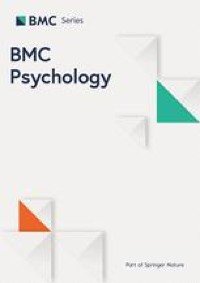Parenting profiles_ motivation towards health-oriented bodily exercise and intention to be bodily lively – BMC Psychology

The aim of this analysis was to establish perceived PS profiles and study whether or not the individuals differed of their motivation towards health-oriented PA and the intention to be bodily lively. On this analysis, it was discovered that individuals differed in motivation towards health-oriented PA (built-in regulation and amotivation), however not in intention to be bodily lively relying on the mixture of perceived love/affection, hostility/aggression, indifference/neglect, undifferentiated/rejection, and management conduct (PS profiles).
On this analysis, there have been two PS profiles: (a) individuals with common scores in maternal/paternal love/affection, hostility/aggression, excessive scores in indifference/neglect, and common scores in undifferentiated/rejection and management; and (b) individuals with excessive scores in maternal/paternal love/affection, hostility/aggression, indifference/neglect, and undifferentiated/rejection, and common scores in management.
In regards to the affect of PS on the motivation towards health-oriented PA, individuals from profile (b) with excessive scores in maternal/paternal love/affection, hostility/aggression, indifference/neglect, and undifferentiated/rejection and common scores in management confirmed increased built-in regulation and amotivation in contrast with profile (a) individuals with common scores in maternal/paternal love/affection, hostility/aggression, excessive scores in indifference/neglect, and common scores in undifferentiated/rejection and management.
In keeping with the SDT, in built-in regulation, individuals carry out behaviors of their very own free will—that’s, the diploma of non-public self-determination is excessive [57]. The SDT additionally postulates that to create motivations with a excessive diploma of integration—that’s to say, that the individual identifies with a conduct to be carried out and due to this fact places it into observe—the first issue is respect for private freedom to hold out the behaviors [57]. This facet is facilitated when dad and mom present love/affection [58, 59]. Profile (b) studies excessive scores in love/affection. These excessive scores appear to be liable for the little children taking part in PA, as a result of it’s in step with their values (integration) [57]. Then again, common scores for maternal/paternal management had been present in profile (b). The shortage of maternal/paternal management could appear to be a variable that enhances freedom of motion in little children; nevertheless, it has been confirmed that the existence of a household construction and its boundaries are perfect for guiding the actions of little children with out essentially inhibiting their freedom [60]. Which means dad and mom of individuals from profile (b) will use guidelines, however they may clarify to their little children the explanations that information their requests for sure conduct [57]. These dad and mom is not going to coerce their sons’ and daughters’ freedom of motion, and favorable scores in built-in motivation might be maintained [57]. Because of this, the built-in regulation will assist these individuals to think about PA as one thing inherent to their values. As well as, there are research that expose that management is related to low-quality motivation and amotivation, particularly whether it is exercised coercively, which may clarify the motivation that defines profile (b) [30].
In keeping with that, it shouldn’t be ignored that individuals from profile (b) reported excessive scores in maternal/paternal hostility/aggression, indifference/neglect, and undifferentiated/rejection. It was beforehand reported that oldsters who gave their little children damaging suggestions reminiscent of humiliation, insults, and criticism (hostility/aggression) throughout PA decreased their notion of competence in it [61]. The shortage of perceived competence to behave makes individuals not really feel motivated [62]. Because of this, the little children is not going to decide to PA observe [62]. In the identical approach, dad and mom who specific indifference/neglect don’t become involved in caring for his or her little children, don’t management them, don’t assist them or improve their self-regulation, and this encourages robust amotivation [63]. In the meantime, parental undifferentiated/rejection (lack of concern and deprivation of affection towards the little children) [64] is negatively associated to perceptions of efficacy [65]. A low notion of efficacy is expounded to amotivation [62]. For the reason that individuals of profile (b) perceived larger amotivation than these of the profile (a), they need to report a decrease dedication to PA [62].
The discovering that profile (b) presents excessive scores in each built-in motivation and amotivation seems contradictory. One potential clarification is {that a} share of the individuals from profile (b) are influenced to a larger extent by maternal/paternal love/affection and management regardless of having maternal/paternal hostility/aggression, indifference/neglect and undifferentiated/rejection, which results in built-in motivation [57, 58]. Then again, maybe within the different share of individuals from profile (b) the constructive motion of maternal/paternal love/affection and management is counteracted by the mixture of maternal/paternal hostility/aggression, indifference/neglect, and undifferentiated/rejection, which leads the individuals to understand excessive amotivation [24, 25, 27, 28].
Relating to the intention to be bodily lively, it has been potential to confirm that there are not any important variations between the individuals from profile (a) with common scores in maternal/paternal love/affection, hostility/aggression, excessive scores in indifference/neglect, and common scores in undifferentiated/rejection and management, and people from profile (b) individuals with excessive scores in maternal/paternal love/affection, hostility/aggression, indifference/neglect, and undifferentiated/rejection, and common scores in management. Regardless of this, there appears to be a larger intention to be bodily lively among the many individuals in profile (b). Profile (b) contains individuals who understand larger maternal/paternal love/affection than profile (a). Earlier analysis has discovered that parental love/affection will increase participation in wholesome actions reminiscent of sports activities golf equipment [43]. This occurs as a result of constructive phrases facilitate the notion of PA competence [66].
Profile (b) additionally has increased scores than profile (a) in maternal/paternal hostility/aggression, indifference/neglect, and undifferentiated/rejection. PA decreases when dad and mom make use of verbal hostility/aggression. It’s because the criticisms that oldsters make throughout their sons’ and daughters’ PA efficiency favor the kids’ perceptions of stress and stress [35]. Dad and mom who use indifference/neglect don’t management their little children and don’t assist them of their choices [37], and this appears to narrate to worse ranges of moderate-vigorous PA observe than amongst offspring of fogeys who present construction [38]. Then again, parental undifferentiated/rejection prevents little children from perceiving efficacy of their actions, as a result of dad and mom deprive them of the indicators of affection essential to understand competence in PA [39]. Contemplating oneself competent in PA facilitates the notion of enjoyment throughout its efficiency [40], a variable linked to participation [67].
Lastly, profile (b) individuals have barely increased scores than profile (a) individuals in maternal/paternal management conduct. Parental management decreases the notion that the actions undertaken emanate from the sons’ and daughters’ personal choices [41], which is often negatively related to PA observe [42]. Contemplating the above, profile (b)’s excessive scores for maternal/paternal hostility/aggression, indifference/neglect, undifferentiated/rejection, and common scores for management, ought to result in decrease intention to be bodily lively than in profile (a). For the reason that outcomes obtained (though not statistically important) are the reverse, the variable that appears to have the best affect on the intention to be bodily lively among the many individuals of profile (b) is love/affection. This may be predicted as a result of the love/affection scores are a lot increased in profile (b) than in profile (a) whereas the scores are extra equal for the opposite PS variables.
Among the many limitations of the analysis, it’s highlighted that the variables examined on this examine had been evaluated with Spanish adults of college age who had been practitioners of PA. The outcomes is probably not generalizable to individuals of different nationalities and completely different age ranges, and with sedentary behaviors. Furthermore, the methodology used is predicated on knowledge evaluation obtained from a self-report questionnaire. Self-report measures could introduce small objectivity biases, reminiscent of social desirability or reminiscence biases. Due to this fact, it could be advisable in future analysis to incorporate samples of different nationalities, completely different age teams, and sedentary individuals to examine if essentially the most practical mixture of PS dimensions for the long run promotion of lively life is similar as that reported within the current investigation. Moreover, different variables, such because the motivational local weather supplied by dad and mom, needs to be examined. Contemplating the motivational local weather that induces concern and the one which results in sporting success, the motivational local weather that induces studying and pleasure in the course of the observe of PA ought to generate larger future curiosity in sports activities observe. Future analysis may study how particular behaviors from the SDT perspective apply to intervention applications and search methods to extend the intrinsic motivation of little children. Lastly, fundamental psychological wants is also examined, since dad and mom affect their sons’ and daughters’ notion of autonomy, competence, and relationships. Apart from, this might situation the sons’ and daughters’ participation in PA.
By way of its sensible implications, this work conveys the concept that dad and mom who transmit excessive love/affection and management at enough ranges favor the motivation of little children towards health-oriented PA. This analysis additionally reveals a slight tendency for prime love/affection to advertise the intention to be bodily lively. Due to this fact, dad and mom ought to provide suggestions that reveals delight of their sons’ and daughters’ efficiency in PA, making them really feel efficient throughout their observe with out ceasing to observe their participation. Because of this, the little children will combine the PA as one thing inherent to their values and take part with out being regulated by their dad and mom. This, in flip, will enhance their curiosity in adopting an lively way of life and stopping lively habits from declining over time. Applications that practice cognitive abilities for constructive parenting ought to contemplate the outcomes of this analysis. This is able to assist little children understand a mixture of acceptable PS variables from their maternal and paternal figures to advertise lively life and enhance the bodily well being of adults.
In conclusion, dad and mom affect the motives that lead little children to provoke new well being outreach behaviors and assist to keep up them over time. Dad and mom ought to provide excessive love/affection and enough ranges of management that facilitate the event of motivations with a excessive diploma of integration towards health-oriented PA of their little children. In the identical approach, this love/affection will assist to protect the kids’ future curiosity within the observe of PA. Dad and mom needs to be thought-about important brokers in interventions that attempt to enhance the well being standing of younger individuals by means of the observe of PA. Figuring out the very best mixture of practical PS variables to facilitate sons’ or daughters’ adoption of an lively way of life will scale back the excessive fee of bodily inactivity and related well being issues in adults.



